Ever walked into a room and felt an immediate sense of freshness, only to wonder what’s behind that crisp air? The secret could be an air scrubber or an air purifier. But wait, aren’t they the same thing? As the debate rages on, many homeowners are left scratching their heads, trying to decipher which device is the golden ticket to pristine indoor air. If you’ve ever been caught in this whirlwind of confusion, you’re in the right place. Dive in as we demystify the world of air quality, and why making the right choice could be the game-changer your home needs.
Key Takeaways
- Air Scrubbers vs. Air Purifiers: While both devices aim to improve indoor air quality, they operate differently. Air scrubbers are typically integrated into HVAC systems and use a combination of filters and chemicals to clean the air. In contrast, air purifiers use filters (like HEPA) to trap pollutants.
- Benefits: Air scrubbers excel in removing microorganisms and can be seamlessly integrated with HVAC systems. Air purifiers are versatile, portable, and effective in allergen removal.
- Drawbacks: Every system has its limitations. For instance, air scrubbers might not be as effective against certain allergens, while air purifiers might require more frequent maintenance.
- Expert Opinions & Studies: Scientific research, such as studies from the EPA, underscores the importance of managing indoor VOC levels. Both air scrubbers and purifiers play a role in this.
- Future of Indoor Air Quality: Technological advancements are on the horizon, with smart homes playing a pivotal role in air quality management.
- Making the Right Choice: Assess your needs, space, and budget to determine the best solution for your home.
Table of Contents
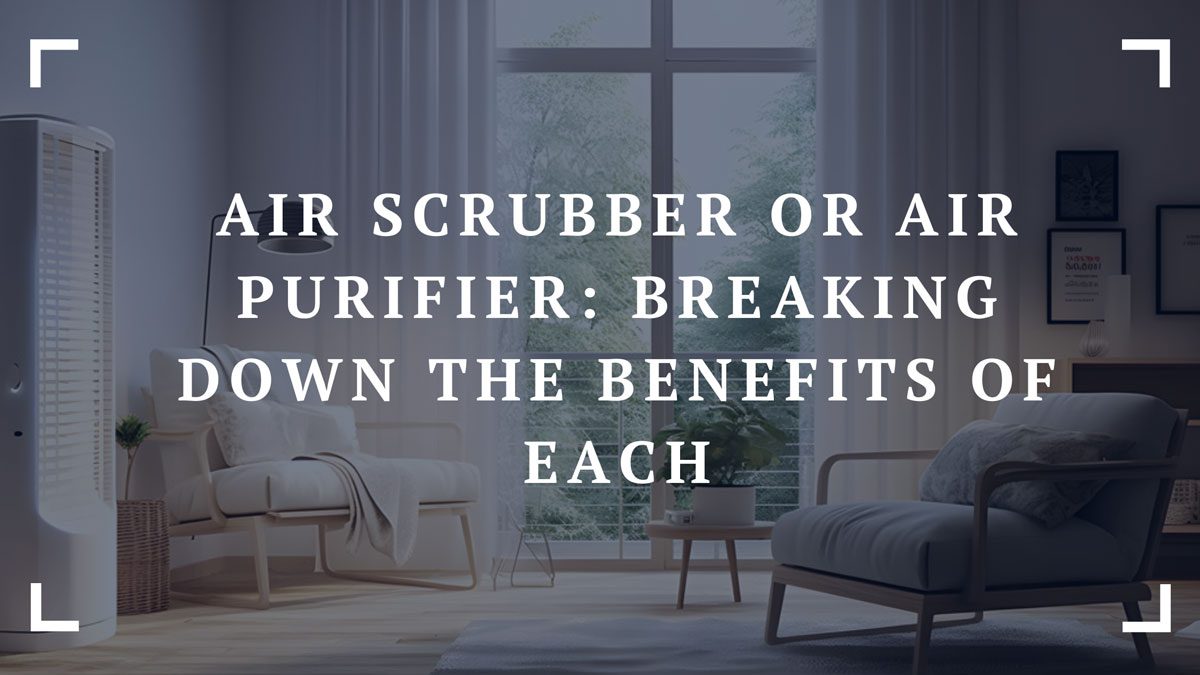
Understanding the Basics
What is an Air Scrubber?
An air scrubber might sound like something out of a sci-fi movie, but it’s a real and incredibly useful device. Its primary function is to improve indoor air quality by removing particles, gases, and sometimes even chemicals from the air.
The Science Behind Air Scrubbing
Air scrubbers operate using a combination of physical filters and sometimes chemical processes. Here’s a breakdown:
- Physical Filtration: Just like a sieve, the air scrubber has filters that trap larger particles from the air. These could be things like dust, pollen, and pet dander.
- Chemical Process: Some advanced air scrubbers use chemical processes, where harmful gases and vapors are transformed into harmless substances. This is particularly useful in industrial settings where harmful chemicals might be released into the air.
- Microbial Elimination: Some air scrubbers are equipped with UV lights or other technologies that can kill microorganisms like bacteria, viruses, and mold spores. If you’re keen on understanding more about the intricate workings of air scrubbers, our article on how air scrubbers work dives deep into the topic.
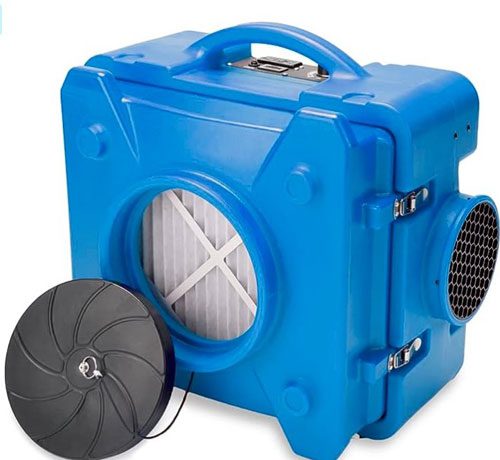
Common Uses and Applications
While air scrubbers were initially more common in industrial settings, they’re now making their way into homes, schools, and offices. Here’s where they shine:
- Homes with Allergy Sufferers: Air scrubbers can drastically reduce allergens, providing relief to those with allergies.
- Mold Remediation: If you’re dealing with mold, an air scrubber is a must-have. In fact, we’ve got a list of the best air scrubbers for mold remediation to help you out.
- Industrial and Construction Sites: These places often release a lot of dust and harmful chemicals into the air. Air scrubbers help keep workers safe.
What is an Air Purifier?
Think of an air purifier as the friendly, everyday device that’s always working silently in the background, ensuring you breathe clean air.
The Mechanics of Air Purification
Air purifiers primarily operate using filters to trap particles. Here’s a closer look:
- HEPA Filters: These are the gold standard in air purification. They can trap 99.97% of particles that are 0.3 microns in diameter (like pollen and dust mites).
- Activated Carbon Filters: These are great for removing odors and gases. If you’ve got a smoker in the house or just cooked fish, you’ll appreciate these.
- UV Lights: Some air purifiers use UV lights to kill germs. It’s like giving harmful microorganisms a lethal sunburn.
- Ionizers: These release negative ions that attract positive ion particles in the air, making them heavy and causing them to fall to the ground.
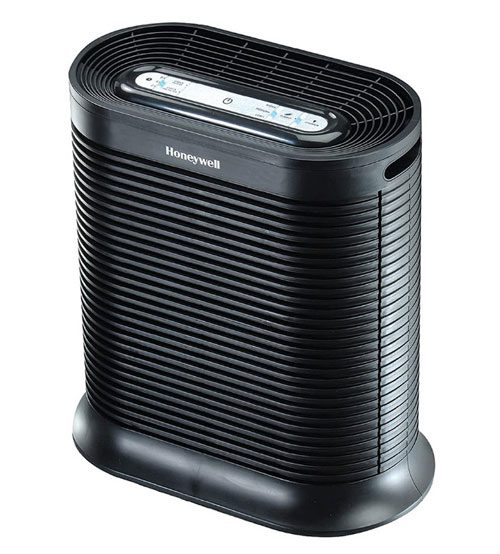
Different Types of Air Purifiers
Air purifiers come in all shapes and sizes:
- Desk Purifiers: Perfect for your workspace, these are compact and focus on purifying the air in immediate proximity.
- Room Purifiers: These are larger and can handle the air in an entire room. They’re great for bedrooms or living rooms.
- Whole-House Purifiers: Integrated into your home’s HVAC system, these ensure that every breath you take indoors is clean.
Key Differences: Air Scrubber vs. Air Purifier
When it comes to improving indoor air quality, both air scrubbers and air purifiers are top contenders. However, they have distinct differences that might make one more suitable for your needs than the other. Let’s dive into the key differences between the two:
Mechanism of Operation
| Pollutants/Contaminants | Air Scrubber | Air Purifier |
|---|---|---|
| Dust & Pollen | Effective | Highly Effective |
| Mold Spores | Highly Effective | Effective |
| Pet Dander | Effective | Highly Effective |
| Smoke (Tobacco, Cooking) | Moderate | Highly Effective |
| VOCs (Volatile Organic Compounds) | Highly Effective | Moderate |
| Bacteria & Viruses | Highly Effective | Effective (with UV-C) |
| Odors (Pet, Cooking, Chemical) | Highly Effective | Effective |
| Gases (Radon, Carbon Monoxide) | Moderate | Not Effective |
Air Scrubber:
- Uses a combination of physical filters and sometimes chemical processes to clean the air.
- Some models use UV lights or other technologies to kill microorganisms.
- Especially effective in removing gases, vapors, and chemicals from the air.
Air Purifier:
- Primarily relies on filters, such as HEPA and activated carbon, to trap particles.
- Some models use UV lights to kill germs or ionizers to make particles fall to the ground.
- Best for removing common allergens like dust, pollen, and pet dander.
Installation and Placement
Air Scrubber:
- Typically larger and more robust.
- Often integrated into an HVAC system, making them more suitable for larger spaces or industrial settings.
- Requires professional installation in most cases.
Air Purifier:
- Portable and comes in various sizes, from desk purifiers to room purifiers.
- Simply plug and play in most cases, with no professional installation needed.
- Can be moved from room to room based on needs.
Maintenance and Upkeep
Air Scrubber:
- Filters may need periodic replacement, especially if used in environments with a lot of contaminants.
- Some models with UV lights might require bulb replacements.
- Regular checks are essential to ensure optimal performance. For a deeper dive into maintenance, check out our guide on air scrubber maintenance.
Air Purifier:
- Filters need to be replaced periodically, with HEPA filters typically lasting 6-12 months.
- Some models have washable filters, making upkeep more straightforward.
- Indicator lights on many models alert you when it’s time for a filter change.
Cost Implications
Air Scrubber:
- Generally more expensive upfront due to their comprehensive cleaning capabilities and larger size.
- Installation costs can add to the initial expense.
- Over time, the cost of replacement filters and potential energy usage can add up.
Air Purifier:
- A wide range of price points, from affordable desk models to high-end room purifiers.
- Ongoing costs include filter replacements and electricity, but these are typically lower than air scrubbers.
Benefits of Each System
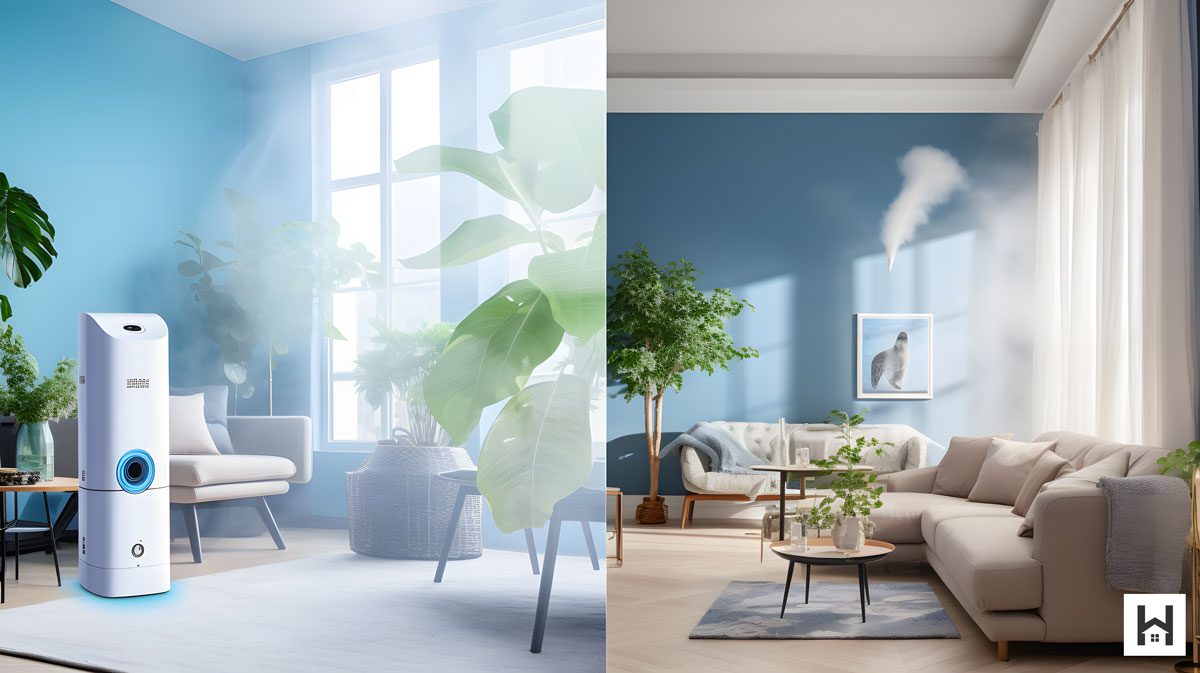
When it comes to enhancing the quality of indoor air, both air scrubbers and air purifiers have their unique strengths. Let’s explore the benefits of each system to help you make an informed decision.
Advantages of Air Scrubbers
Air scrubbers are powerful devices designed to handle a broad spectrum of airborne contaminants. Here are some of their standout benefits:
Superior Removal of Microorganisms
- Deep Cleaning: Air scrubbers are equipped with advanced technologies, such as UV lights, that can effectively eliminate harmful microorganisms, including bacteria, viruses, and mold spores. This ensures a more sterile environment, especially crucial in settings like hospitals or homes with immunocompromised individuals.
- Chemical Neutralization: Some air scrubbers can neutralize harmful chemicals and gases, transforming them into harmless substances. This is particularly beneficial in industrial settings or homes with high VOC (Volatile Organic Compounds) levels.
Integration with HVAC Systems
- Whole-House Cleaning: By integrating with your home’s HVAC system, air scrubbers can purify the air throughout your entire home, ensuring consistent air quality in every room.
- Energy Efficiency: Since they work in tandem with your HVAC system, air scrubbers can be more energy-efficient. They clean the air as your HVAC system operates, without the need for additional power sources.
Advantages of Air Purifiers
Air purifiers are versatile devices designed to tackle common indoor air pollutants. Here’s what makes them shine:
Versatility and Portability
- Move It Around: One of the significant advantages of air purifiers is their portability. You can easily move them from one room to another, targeting areas that need the most attention, like bedrooms during allergy season or kitchens after cooking.
- Size Options: Whether you need a compact purifier for your office desk or a larger one for your living room, there’s an air purifier to fit every need.
Effective Allergen Removal
- Breathe Easier: Air purifiers, especially those with HEPA filters, are champions at trapping common allergens like dust, pollen, and pet dander. This can be a game-changer for allergy sufferers, providing relief and ensuring a good night’s sleep.
- Odor Elimination: Thanks to activated carbon filters, air purifiers can also remove odors from the air. Whether it’s the lingering smell of last night’s dinner or a pet odor, air purifiers help keep your home smelling fresh.
Potential Drawbacks to Consider
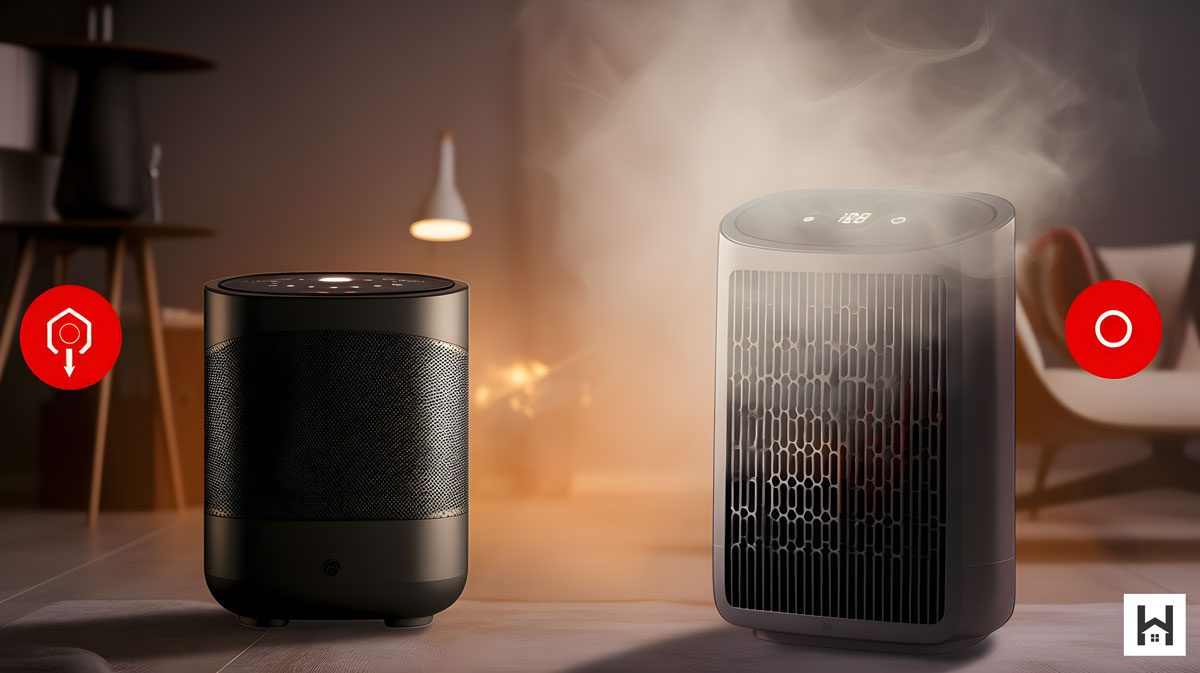
While air scrubbers and air purifiers offer numerous benefits, it’s essential to be aware of their limitations to make an informed decision. Let’s delve into the potential drawbacks of each system.
Limitations of Air Scrubbers
Air scrubbers are powerful and comprehensive in their cleaning capabilities, but they come with their own set of challenges:
Initial Cost and Installation
- Higher Upfront Cost: Air scrubbers generally have a higher initial cost compared to most air purifiers. This can be a significant factor for homeowners or businesses on a tight budget.
- Professional Installation: Unlike plug-and-play air purifiers, air scrubbers often require professional installation, especially if integrated into an HVAC system. This adds to the initial expense and might cause some disruption as the system is set up.
Maintenance and Replacement Parts
- Regular Maintenance: To ensure optimal performance, air scrubbers require regular maintenance. This might include cleaning or replacing filters and checking other components.
- Replacement Costs: Over time, components like UV bulbs or specialized filters might need replacement, adding to the overall cost of ownership.
Limitations of Air Purifiers
Air purifiers are versatile and user-friendly, but they have their own set of limitations:
Coverage Area
- Limited Range: Most portable air purifiers are designed for specific room sizes. If placed in a room larger than their capacity, their effectiveness diminishes. You might need multiple units for larger homes or open-plan spaces.
Filter Replacement and Maintenance
- Ongoing Costs: Filters, especially HEPA and activated carbon ones, need periodic replacement. Over time, these costs can add up.
- Maintenance Checks: While generally low-maintenance, air purifiers still require regular checks to ensure they’re working efficiently. This includes cleaning or replacing filters and ensuring the unit is free from obstructions.
Noise Levels
- Potential Noise: Some air purifiers can be noisy, especially on higher settings. While many modern units are designed to be whisper-quiet, it’s something to consider, especially if you’re sensitive to noise or placing the unit in a bedroom.
Expert Opinions and Case Studies
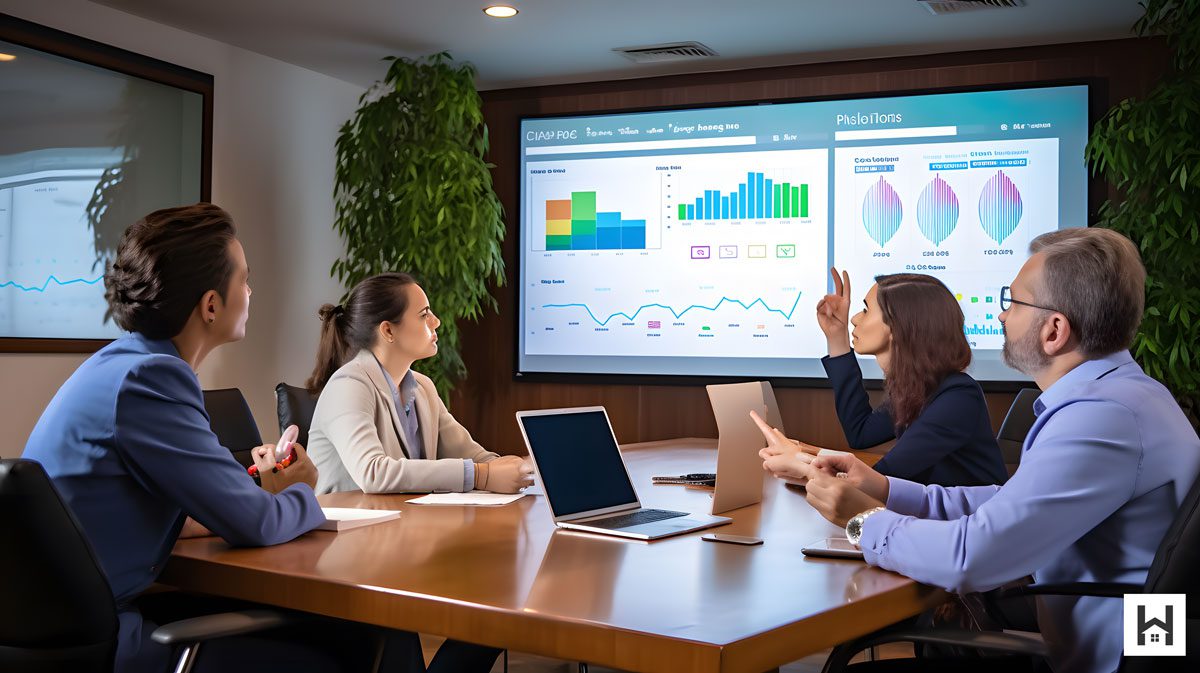
When making a decision about air quality solutions, it’s always beneficial to consider expert opinions and real-world case studies. They provide valuable insights and can help validate the effectiveness of each system.
Testimonials from Homeowners
Air Scrubbers:
- Jane from Seattle: “Ever since we installed an air scrubber in our home, my allergy symptoms have significantly reduced. It’s been a game-changer, especially during pollen season.”
- Carlos from Miami: “Our home used to have a persistent moldy smell due to high humidity. The air scrubber not only eliminated the odor but also improved the overall air quality.”
Air Purifiers:
- Liam from New York: “Living in the city means dealing with pollution and dust. My air purifier has made a noticeable difference, and I wake up feeling more refreshed.”
- Aisha from Los Angeles: “I have two cats, and while I love them, I don’t love the pet dander. My air purifier has been fantastic in keeping the air clean and reducing my allergy flare-ups.”
Scientific Studies Supporting Each System
Air Scrubbers:
- A study from the Environmental Protection Agency (EPA) highlighted the effectiveness of air scrubbers in removing volatile organic compounds (VOCs) and other pollutants from indoor environments, especially in industrial settings.
- Research published in the Journal of Environmental Sciences demonstrated the capability of air scrubbers to neutralize harmful chemicals, showcasing their potential in providing safer indoor air.
- Volatile Organic Compounds and Indoor Air Quality: The US Environmental Protection Agency (EPA) has conducted extensive research on the impact of Volatile Organic Compounds (VOCs) on indoor air quality. VOCs are emitted as gases from certain solids or liquids and can have both short-term and long-term adverse health effects. The EPA found that concentrations of many VOCs are consistently higher indoors than outdoors, sometimes up to ten times higher. This is where the role of air scrubbers and purifiers becomes crucial. They help in reducing the concentration of these harmful VOCs, ensuring a safer indoor environment. Read more about the EPA’s findings here.
Air Purifiers:
- The World Health Organization (WHO) has cited the benefits of HEPA-filtered air purifiers in trapping airborne viruses and reducing the spread of illnesses.
- A study in the Journal of Allergy and Clinical Immunology found that homes with air purifiers showed a significant reduction in allergens, leading to improved respiratory health among residents.
Making the Right Choice for Your Home
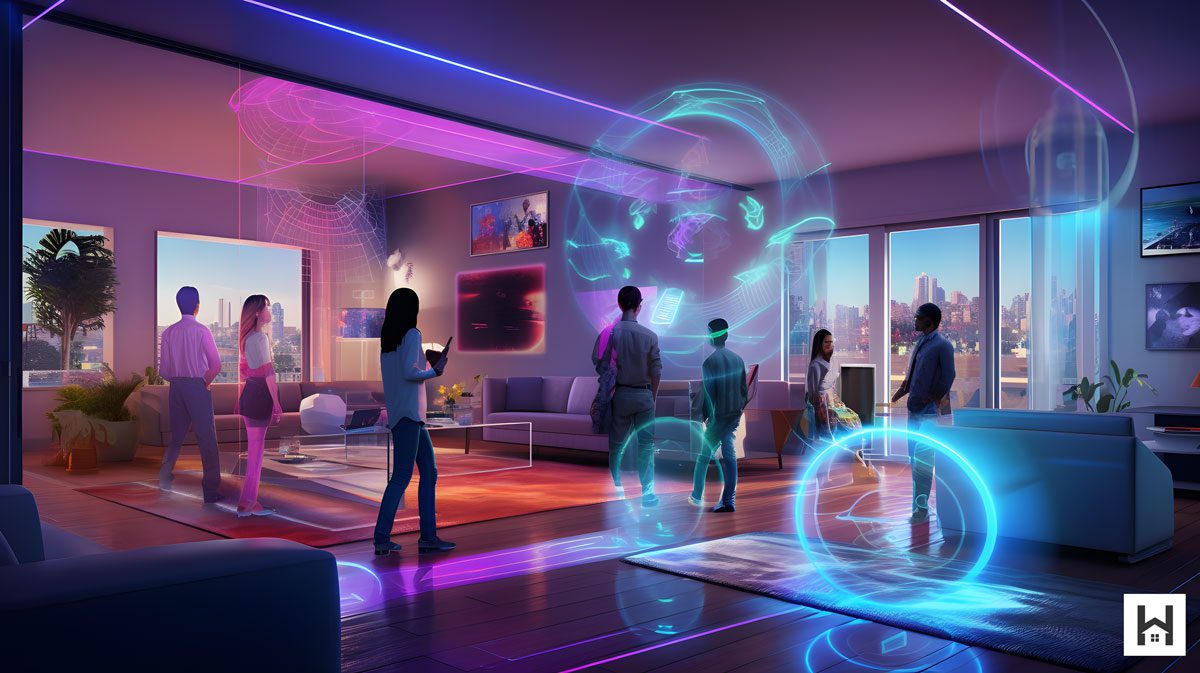
Choosing between an air scrubber and an air purifier comes down to understanding your specific needs and circumstances. Here are some factors to consider:
Assessing Your Primary Needs
- Health Concerns: If someone in your household has severe allergies, respiratory issues, or a compromised immune system, you might lean towards the comprehensive cleaning capabilities of an air scrubber.
- Environmental Factors: Consider the quality of outdoor air, the presence of industrial facilities nearby, or if you live in a high-pollution area. These factors can influence your decision.
Considering the Size and Layout of Your Space
- Space Size: Larger homes or open-plan designs might benefit more from an air scrubber integrated with the HVAC system, ensuring consistent air quality throughout.
- Room-Specific Needs: If you’re looking to target specific rooms, like bedrooms or a home office, a portable air purifier might be the better choice.
Budget Considerations
- Initial Costs vs. Long-Term Maintenance: While air scrubbers might have a higher upfront cost, consider the long-term maintenance and replacement costs of both systems.
- Energy Consumption: Think about the energy efficiency of each system, especially if you’re environmentally conscious or looking to keep utility bills in check.
Installation and Maintenance Tips
| Feature | Air Scrubber | Air Purifier |
|---|---|---|
| Average Lifespan | 5-10 years | 3-7 years |
| Filter Replacement | Every 1-2 years | Every 6-12 months |
| Maintenance Frequency | Bi-annually (Check) | Quarterly (Clean/Check) |
| Energy Consumption | Low-Medium | Low |
| Best For | Larger spaces, HVAC integration | Individual rooms, portability |
DIY vs. Professional Installation
When it comes to setting up your air scrubber or air purifier, you have two primary options: Do It Yourself (DIY) or hiring a professional.
DIY: Many air purifiers are plug-and-play, meaning you can easily set them up yourself. Just ensure you place them in a location where they can effectively circulate air, away from obstructions.
Professional Installation: Air scrubbers, especially those integrated with HVAC systems, often require professional installation. This ensures they’re set up correctly, optimizing their efficiency and effectiveness.
Regular maintenance routines for longevity
To ensure your air cleaning system operates at peak performance, regular maintenance is crucial.
- Air Scrubbers: Typically, you’ll need to replace the cell or filter every 1-2 years, depending on usage. Also, ensure the system is free from obstructions and that airflow is unrestricted.
- Air Purifiers: Filters should be replaced as per the manufacturer’s recommendations, usually every 6-12 months. Some models come with washable filters, which should be cleaned regularly.
The Future of Indoor Air Quality Solutions
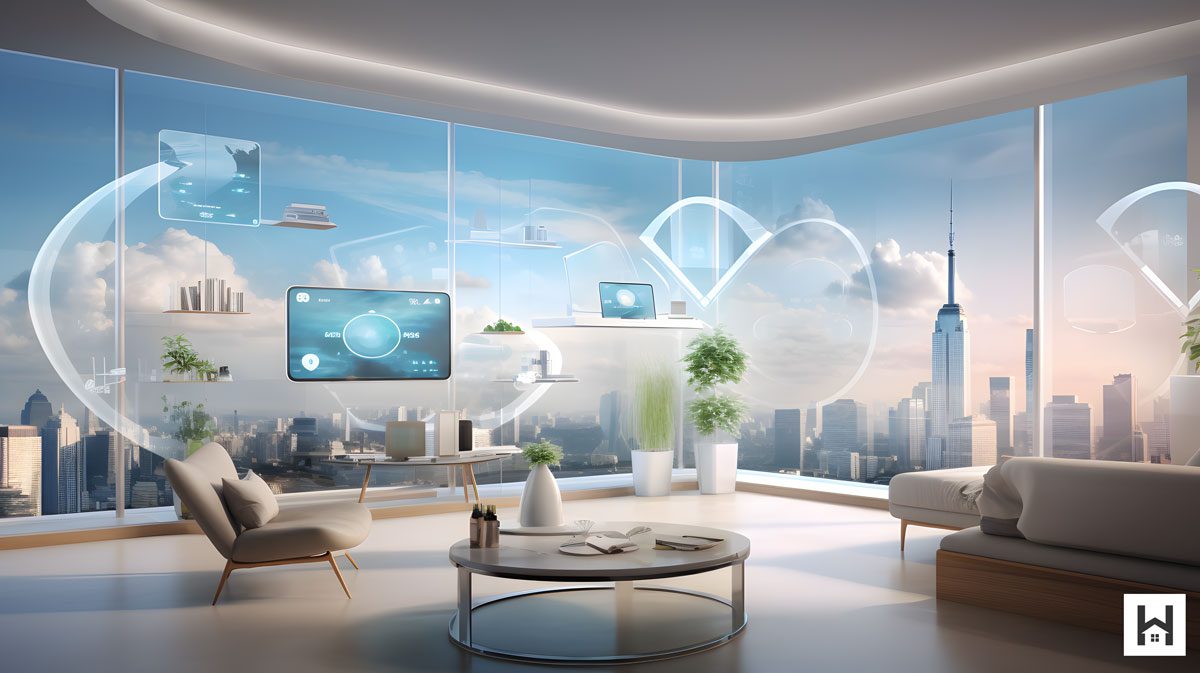
Technological advancements on the horizon
The world of indoor air quality is rapidly evolving, with new technologies emerging regularly. We’re seeing innovations like UV-C light integration, which can kill bacteria and viruses, and advanced HEPA filters capable of trapping even smaller particles.
The role of smart homes in air quality management
Smart homes are revolutionizing how we manage indoor air quality. With connected devices, homeowners can monitor and adjust air quality in real-time, using apps or voice commands. For instance, smart air purifiers can adjust their settings based on current air quality readings, ensuring optimal performance without manual intervention.
FAQ
Are air scrubbers and air purifiers safe for pets?
Absolutely! Both air scrubbers and air purifiers are designed to improve indoor air quality, which benefits not only humans but also our furry friends. In fact, these devices can help reduce pet dander in the air, which can be beneficial for both the pets and family members who might have allergies.
How do I know when it’s time to replace the filters or cells in my device?
Most modern air purifiers and air scrubbers come with indicators that alert you when it’s time for a replacement. However, as a general rule of thumb, you should check the manufacturer’s guidelines. If you notice a decrease in air quality or increased allergies, it might be time for a change.
Can I move my air purifier from one room to another?
Yes, most air purifiers are designed to be portable. You can move them to different rooms as needed. However, for optimal performance, it’s best to keep them in one place for a consistent duration, especially during high-pollution days or allergy seasons.
Do air scrubbers produce any noise?
Air scrubbers, like any device with a fan or motor, produce some level of noise. However, most residential air scrubbers are designed to be relatively quiet. If noise is a concern, look for models that specifically mention low noise levels or have a “night” or “quiet” mode.
How do air purifiers and air scrubbers fare against cigarette smoke?
Both air purifiers and air scrubbers can be effective against cigarette smoke. They can remove particulate matter and reduce the odor associated with smoke. However, if you’re specifically looking to combat cigarette smoke, ensure the device you choose is rated to handle smoke particles and odors effectively.
Conclusion
Your home’s air quality plays a pivotal role in your health and well-being. Whether you opt for an air scrubber, an air purifier, or another solution entirely, it’s crucial to make an informed choice. Research, understand your needs, and consult professionals if necessary.
We at OmniHomeIdeas value our community’s insights and experiences. If you’ve had experiences with air scrubbers or purifiers, or if you have questions, we encourage you to join our community discussions. Together, we can ensure everyone breathes a little easier.


